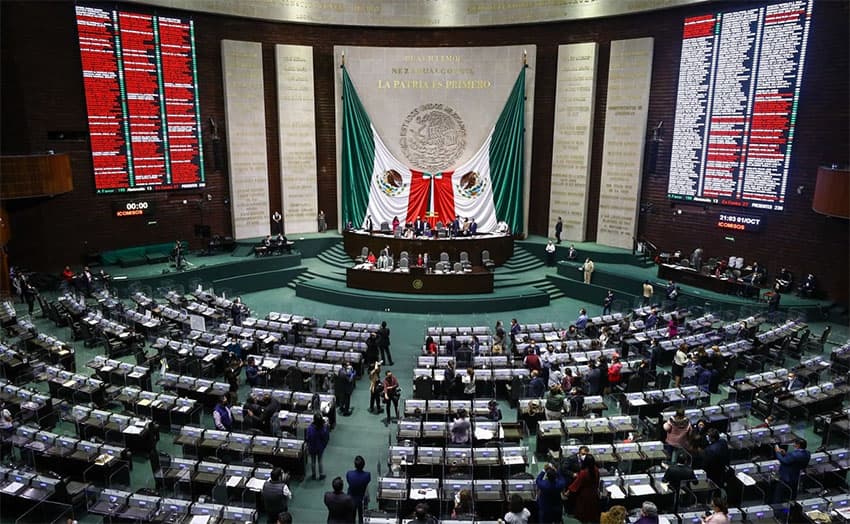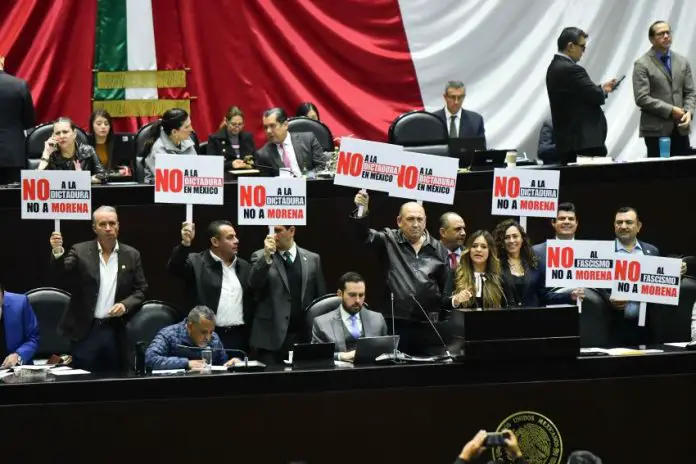The lower house of federal Congress approved on Wednesday a constitutional bill that seeks to eliminate seven watchdog agencies including the national transparency agency.
Lawmakers with the ruling Morena party and its allies voted in favor of the bill that former president Andrés Manuel López Obrador sent to Congress in February targeting several autonomous government bodies.

The final count was 347 votes in favor — 13 more than the number needed to reach the two-thirds majority required to approve constitutional bills — and 128 against.
The Chamber of Deputies’ approval of the constitutional reform proposal was en lo general, or in a general sense. Individual articles of the bill were set to be considered by lawmakers on Thursday ahead of a vote en lo particular.
The bill, which has not yet been considered by the Senate, seeks to disband the following seven autonomous agencies:
- The National Institute for Transparency, Access to Information and the Protection of Personal Data (INAI).
- The Federal Economic Competition Commission (Cofece).
- The Federal Telecommunications Institute (IFT).
- The National Council for the Evaluation of Social Development Policy (Coneval).
- The Energy Regulatory Commission (CRE).
- The National Hydrocarbons Commission (CNH).
- The National Commission for the Continuous Improvement of Education (Mejoredu).
If the bill becomes law — essentially a fait accompli given Morena’s congressional dominance — the responsibilities of the autonomous agencies will be absorbed by government ministries and departments in most cases.
INAI’s responsibilities, for example, would be transferred to the Anti-Corruption and Good Governance Ministry (formerly called the Ministry of Public Administration), while the Energy Ministry would take over the work of the CRE and the CNH.
The work of Cofece, Mexico’s antitrust agency, and the IFT could be taken over by a new “decentralized” body that would have “technical independence” from the government. Morena lawmakers are seeking to create such a body.
Lawmakers affiliated with the government led by President Claudia Sheinbaum said that the main aim of the reform is to save money — more than 4 billion pesos (US $196.5 million) annually, according to an El País newspaper report.

Morena Deputy Olga Sánchez said that the reform will lead to the creation of regulatory systems similar to those of the United States and Canada.
Opposition lawmakers argued that it will have an adverse impact on transparency in Mexico and independent assessment of government policy. They claimed it is conducive to government opacity rather than transparency.
“Not even in the worst periods of the PRI and the PAN … did we think that we would arrive at a moment like this, of destruction … of the autonomous bodies” said Citizens Movement Deputy Anayeli Muñoz in reference to the periods when the Institutional Revolutionary Party and the National Action Party were in office.
If the bill becomes law, regulation of key sectors of the Mexican economy, the provision of information to citizens, including journalists, and compliance with transparency laws will become responsibilities of government ministries and departments that follow the directives of Sheinbaum and her cabinet ministers.
The government will be responsible for being transparent about its own actions, expenditure and decisions.
Critics have long argued that the incorporation of autonomous agencies into government ministries and other federal departments would eliminate important counterweights to government power and represent a backward step for democracy. The reform is seen by many as an attempt to concentrate power in the executive branch of government.
Mexico’s lower house approved a reform to disappear 7 autonomous agencies, including INAI, the transparency agency. (Modifications to be debated Thurs.) The functions of these organs would be absorbed into other government agencies, raising concerns about independence. https://t.co/tssnizfoTF
— Carin Zissis (@CarinZissis) November 21, 2024
Sheinbaum said Thursday that the reform will lead to “more transparency” and help to eliminate corruption.
López Obrador was an outspoken critic of autonomous government agencies, accusing them of corruption and other ills and railing against their large budgets. Sheinbaum has made the same criticisms.
She said earlier this month that the creation of a “body with technical independence” to take on the work of Cofece and the IFT would ensure compliance with the USMCA, the North American free trade pact.
“I suggested to the deputies … to have a body with technical independence because that is the wording of the agreement, so that there is no problem [with the United States and Canada],” Sheinbaum said.
The bill aimed at eliminating the seven autonomous agencies is one of several constitutional reform proposals considered by Congress since lawmakers elected in June assumed their positions on Sept. 1.
Among those that have have recently been approved, ratified by a majority of state legislatures and signed into law are a controversial judicial overhaul and a reform that placed the National Guard under military control.
With reports from Reforma, El País, El Universal and Publimetro
